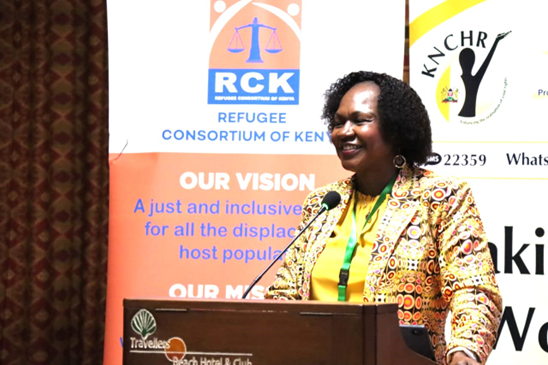Empowering Duty Bearers Dealing with Refugees: KNCHR Champions Human Rights Training for Law Enforcement in Coastal Region
Empowering Duty Bearers Dealing with Refugees: KNCHR Champions Human Rights Training for Law Enforcement in Coastal Region
By: Dominic Kabiru- Head of Public Affairs and Communication- KNCHR

The Kenya National Commission on Human Rights Chairperson, Roseline Odede during the opening of the two days training for duty bearers and law enforcement officers in Mombasa County. She said; “Refugees Rights are Equal to Citizens’ Rights”. (Photo: Courtesy- KNCHR Public Affairs & Communication Division)
In a significant event held on 27th and 28th November, 2023 in Mombasa County, the Chairperson of the Kenya National Commission on Human Rights, Roseline Odede inaugurated a two-day workshop, focused on training law enforcement and security agencies officers in a Rights-Based Approach (HRBA) to advance the rights of urban refugees and host communities in the Kenya’s Coast region.
This was part of a series of training that are slated to take place in the course of the Refugees and host communities project, that was launched two weeks ago. The Chairperson expressed optimism in the proactive engagement with duty bearers initiated by the Kenya National Commission on Human Rights and the Refugees Consortium of Kenya, emphasizing the goal of equipping duty bearers with knowledge and skills essential for mainstreaming human rights in the protection of refugees and the host communities.
Acknowledging the crucial role of the State as the primary duty bearer for human rights, the KNCHR Chairperson underscored the collaborative responsibility with other stakeholders. In particular, the Chairperson highlighted the vital role played by host communities in supporting the State's efforts to respect, promote, and protect the rights of refugees in Kenya. The call for support extended to all relevant stakeholders, emphasizing the collective effort required for effective human rights promotion and protection.
Kenya's Role as a Refugee-Hosting Nation
In her opening remarks, the Chairperson shed light on Kenya's prominent status as one of the largest refugee-hosting nations in Africa, hosting a population of 577,492 refugees. The urban refugee population, constituting approximately 16% of registered refugees, faces unique challenges compared to those in designated camps. Notably, Mombasa emerges as the second focal point for urban refugee matters, signifying its importance in the broader context of refugee rights. During the training engagements, Mr. Peter Mutuma, the head of Department of Refugee Services in Mombasa, told participants that there is an estimated 20,000 urban refugees residing in Mombasa County and its environs.

Mr. Samson Omondi, an Assistant Director and the Project Lead from the Kenya National Commission on Human Rights highlights the genesis of the project conceptualization to the duty bearers and law enforcement officer in Mombasa.(Photo: Courtesy- KNCHR Public Affairs & Communication Division)
Challenges Faced by Urban Refugees
During the training sessions, it was affirmed that urban refugees confront a myriad of challenges, including difficulties in accessing documentation, tertiary education, medical attention, and essential services. Equally, living among host communities, they navigate challenges that often lead to conflicts with law enforcement agencies. The Chairperson acknowledged the complexities of the situation and emphasized the need for tailored approaches in addressing the specific challenges faced by urban refugees.
Importance of Collaboration with Host Communities
The KNCHR Chairperson further emphasized the crucial role of law enforcement officers working hand in hand with host communities for the seamless integration of refugees. Supporting host communities in providing shelter, social support, economic opportunities, advocacy and awareness becomes paramount for the success of law enforcement agencies' work in policing urban-based refugees. This collaborative approach aims to enhance the understanding of law enforcement officers within the spectrum of promoting and protecting the rights of refugees and host communities, rather than being perceived as violators.
Building Capacity for Better Realization of Human Rights
The Chairperson highlighted the vulnerability exposed by the influx of urban refugees, leading to instances of infringement on fundamental freedoms and human rights. To address this, the Commission believes in the importance of building the capacity of duty bearers while empowering right holders (here referred to as the refugees) on their rights and responsibilities. On the latter, she emphasized that refugees also have obligations to adhere to as set by the host country for harmonious interaction with the host communities. The two-day training was positioned as a significant step toward achieving this goal, fostering a perspective shift among law enforcement officers towards being champions of human rights.

Training of duty bearers drawn from the law enforcement agencies, Department of Refugees Services, County government of Mombasa and the National Government Administration Officers (NGAO) (Photo: Courtesy- KNCHR Public Affairs & Communication Division)
Commitment to Human Rights Promotion
The Chairperson emphasized the two days of training was a testimony of the Commission's commitment, in collaborating with key stakeholders and partners such as Refugees Consortium of Kenya, Department of Refugee Services and the United Nations High Commissioner for Refugees (UNHCR), to promote and protect human rights for urban refugees and host communities in the Kenya’s Coastal region. The training signifies a collective effort towards a more informed, empowered, and rights-centric approach within law enforcement agencies, contributing to a safer, more inclusive environment for refugees and host communities in Kenya.